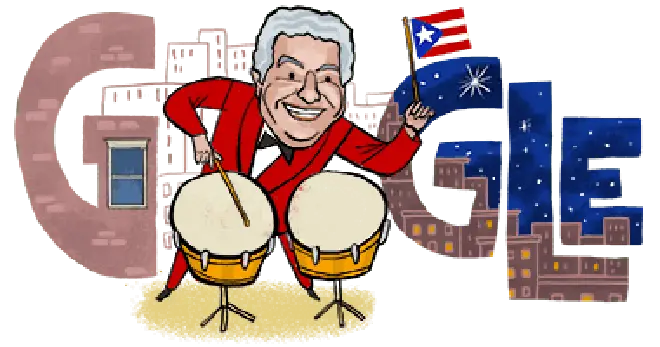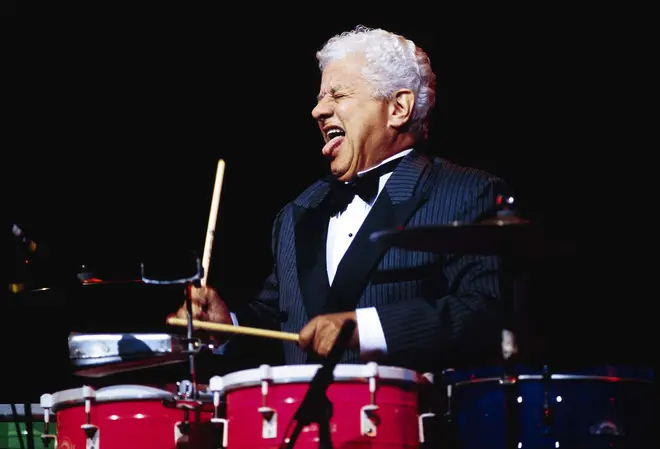Google Doodle celebrates Tito Puente – but who is ‘The King of Latin music’?
11 October 2022, 16:08 | Updated: 11 October 2022, 16:46

The musician behind the 1962 cha-cha-chá hit, ‘Oye Cómo Va’, is celebrated with a Google Doodle to mark US Hispanic Heritage Month.
On 11 October, Google transformed its home page with a caricature-like Doodle of American percussionist, composer, and entertainer, Tito Puente. Puente is best known for his 1963 hit, ‘Oye Cómo Va’, a cha-cha tune that was later covered by the rock group Santana, to great acclaim.
Today, Google’s portrait pays homage to the musician’s Puerto Rican heritage in US Hispanic Heritage Month, as Puente waves the country’s flag whilst playing a set of drums in an illustration by fellow Puerto Rican New Yorker, Carlos Aponte.
Born in Harlem, New York City, to Puerto Rican parents in 1923, Tito Puente’s musical drive as a young child was relentless. Much to the annoyance of their neighbours, Puente would wander around the house drumming out rhythms on anything that would make a loud enough sound.
After a complaint from those next door, Puente’s mother enrolled the then seven-year-old in piano lessons at 25 cents a pop. Three years later, he stopped piano lessons in favour of percussion – and never looked back.
Read more: Why is the steelpan being celebrated in today’s Google Doodle – and what’s the instrument’s history?

Celebrating Tito Puente
After serving in the US Navy during the Second World War, where he led the ship’s band as a saxophonist, Puente was able to attend the prestigious Juilliard School of Music in New York, where he studied conducting, orchestration, and music theory.
Puente enjoyed great success in his teens as a drummer in various groups, and reached the height of his fame in the 1950s after founding the Tito Puente Orchestra. With Puente at its helm, the orchestra popularised Afro-Cuban and Caribbean musical genres and instruments with infectious groove and an entertaining stage presence, filling dance floors wherever they performed.
Puente was a brilliant multi-instrumentalist, but is most renowned for his sheer excellence on the timbales. The percussive instruments arose in 20th-century Cuba as an alternative to the classical timpani. Their higher pitch makes them useful for expressive drum fills, with a variety of techniques from rim shots to rolls.

Puente cut his teeth on the Cuban dance genre, mambo, and was instrumental in bringing Latin American dance music into the mainstream. He later branched out into boogaloo and salsa, eventually earning the titles of ‘El Rey de los Timbales’ (The King of the Timbales) and ‘The King of Latin Music’.
Not only was he a prolific performer and recording artist, with over 118 albums bearing his name and plenty more collaborations, Puente was passionate about music education and bringing to the fore the next generation of Latin musicians. In 1979, Puente founded a scholarship fund, providing opportunities to young Latin percussionists for more than two decades.
Puente died in 2000, but his legacy lives on today with a host of awards, achievements, and honours bestowed on the great musician both before and after his death. He was awarded the Billboard Latin Music Lifetime Achievement Award in 1995, and performed at the closing ceremony to the 1996 Summer Olympics in Atlanta, Georgia.
He also made a number of television appearances, on two episodes of The Simpsons, as well as a performance on Sesame Street.
Read more: Google celebrates legendary British composer and opera singer, Amanda Aldridge, with Doodle

Sesame Street: Real Grouches Don't Dance
From 1969, Puente held the Key to the City of New York, and a star bearing his name on the Hollywood Walk of Fame was unveiled in 1990. Two months after his death, East 110th Street, where he spent much of his childhood, was renamed Tito Puente Way, and he was also awarded a posthumous Lifetime Achievement Award at the 2003 Grammys.


































